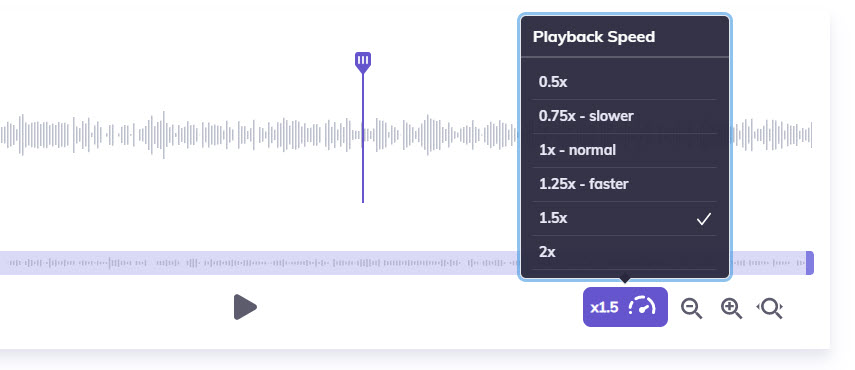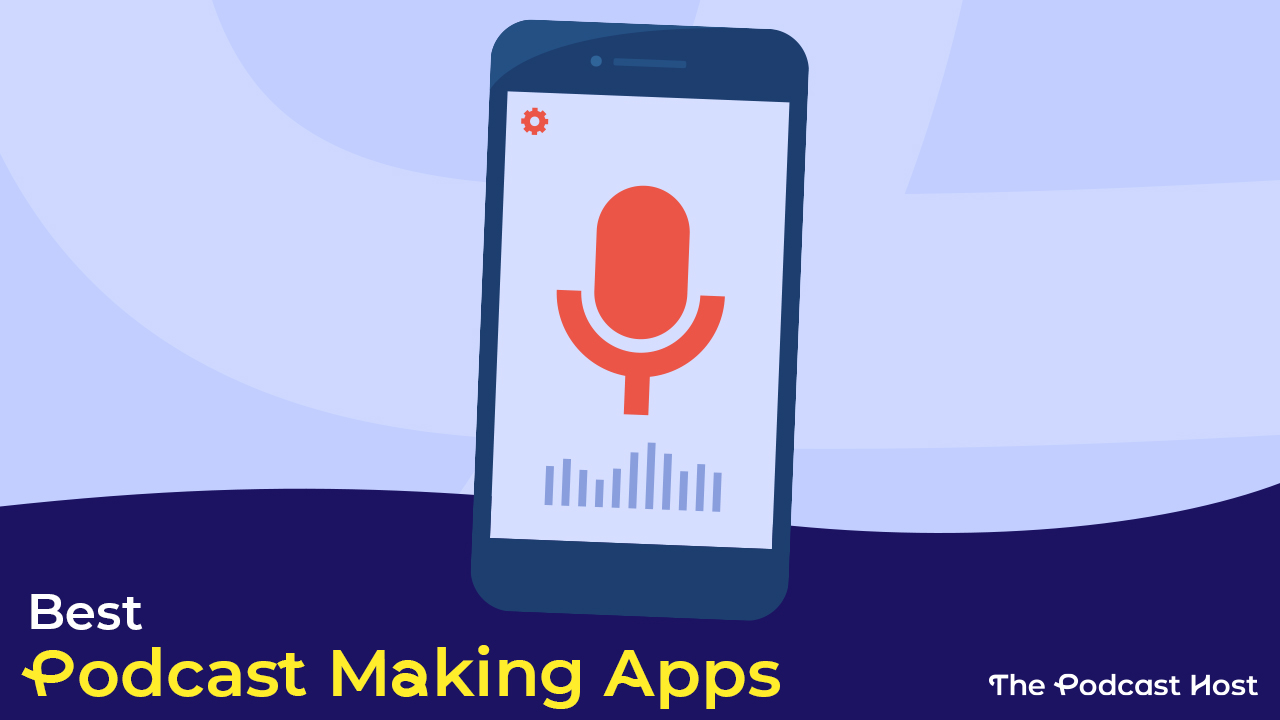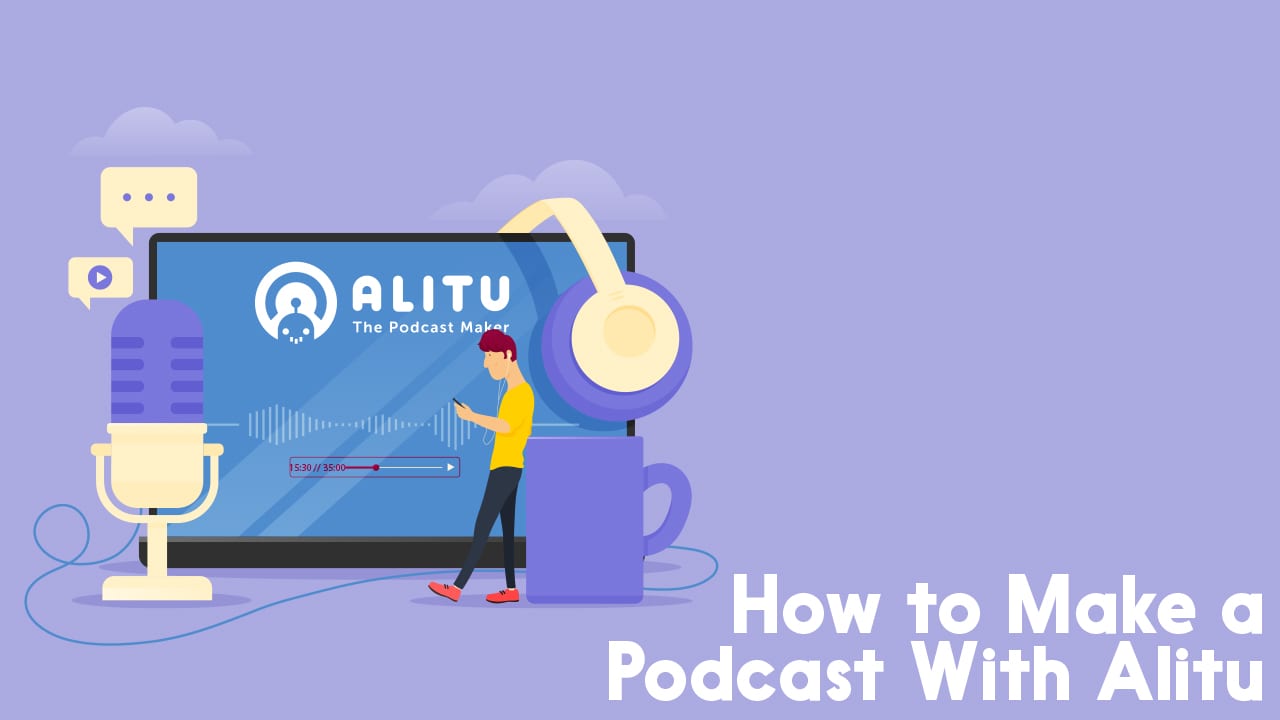This post is also available in: Português
For every struggle faced by the human race, there’s an app developer building a handy solution. It’s no big surprise, then, that a handful of podcast making apps have emerged in recent years.
I should start by clarifying what I mean by “app.” In this article, we won’t be covering fully-fledged podcast software, like Audacity or Audition. Instead, the focus here is on dedicated apps that were designed to take at least a couple of the recording, editing & publishing trifecta, and make them really easy for podcasters.
List of the Best Podcast Making Apps
So if you’re looking for the best podcast making app, what options are available to you currently? And which one is the best fit for you? Read on and find out…
A quick disclaimer that we sometimes use affiliate links to products or services we think you might find useful. We earn a small commission should you choose to sign up through any of them, though at no extra cost to yourself!

Editor’s Note
Our ‘Best Podcast Making Apps’ guide was originally written in 2019. We update this post periodically to reflect changes in technology, our recommendations, and because we’re always learning new things!
1. Alitu: The Podcast Maker Tool
Alitu is a web app that we developed ourselves because so many of our readers told us that they hated editing, processing, and publishing. Or at the least, found it tricky and time-consuming. It seemed like loads of people were procrastinating over starting a podcast because of the thought of learning something like Audacity or Audition.

Alitu was designed to make recording, editing, and publishing super-easy. The outcome is that you can create a podcast without knowing the slightest thing about audio production.
You can record a call (or a solo audio track) inside Alitu. Or, you can simply upload your recordings – anything from a SquadCast interview, to a phone recording, to a Zoom webinar, and Alitu does the rest. It’ll do the conversion, EQ, compression, levelling, noise reduction, and more, to get your audio sounding great.
Then, you can jump into Alitu’s editing tools – offering you top and tail functions, plus the ability to easily remove any mistakes from your audio.
Once that’s done, the episode builder lets you piece together as many clips as you need, from solo segments, to ads, to listener call-ins, and it’ll add your theme music automatically at the start and end.
Finally, you can publish directly to Alitu via its podcast hosting, publish it directly to a paired alternative host, or download the file for manual upload elsewhere. This makes Alitu perfect for new podcasters and existing podcasters alike.
Alitu will also automatically create transcriptions of your episodes, which is a big step towards making your podcast accessible for all.
One of my favourite features is the edit playback speed. If you’ve recorded, say, an hour-long call, you can listen back through it to make any edits in literally half the time.

Your Alitu account gives you access to a free library of music and transitions, as well as video courses on launching your podcast and choosing your equipment. New features and perks are being added all the time, too!
App Type: Browser (mobile coming soon!)
Price: $32 monthly subscription. 7 day free trial available.
You Might Use It If: You’re looking to focus on creating content, rather than learning the ins and outs of remote recording and audio production. But at the same time, you still want to be putting out a professionally produced show, mixed to podcast industry loudness standard levels, with any fluff or mistakes removed.
Also, Alitu is perfect if you’re looking for a single place to do everything: from recording and editing, to transcriptions and publishing.
2. Podbean Podcast App
Brought to you by media hosting veterans Podbean, this app is a fully-fledged listening and discovery app first and foremost – but it has some handy creation and publishing tools, too.

Those making a podcast inside the app can record their content, mix in sound effects, and have the option of using music from an extensive library or simply importing their own.
What the Podbean Podcast App lacks in editing and production capabilities, it makes up for with its recording features. You can record up to eight participants in multitrack, though each person will need to be signed in to the app to make it all work.
Recording is done “as live,” but you can pause and re-start your recording at any point. With Podbean Live you can record guests, co-hosts, and even take listener calls.
As Podbean are a media host, you can publish directly to their platform once your episode is created, or you can download the file to use elsewhere.
App Type: Desktop or Mobile
Price: You can use the app for free, but storage and bandwidth will be limited. Paid tiers offer more options and start from $14 a month ($9 per month when billed annually).
You can get a month’s free hosting with Podbean when you sign up using the coupon code podcraft
You Might Use It If: You want multitrack and live-streaming capabilities on your mobile device. Also, if you’d like to use Podbean as your show’s media host. They have a lot of really cool features including monetisation and premium content options. For more, see our full Podbean review.
3. Spreaker Studio
Spreaker is another top media hosting and monetisation platform for podcasters. Their Spreaker Studio app is a great tool for creators, too.

It comes as either a desktop or mobile app and works in a similar vein to an online radio station, with the option to go live and interact with your listeners in real-time through its chat function.
If you don’t want to go live, you simply select ‘Offline Mode’ to record your episode, then publish it manually once you’re happy with it.
Like Podbean, you can play effects and clips as you go. On the editing front, Spreaker Studio offers a trimming function that lets you top and tail your recording, prior to upload.
Spreaker really shines as a “live production” tool, allowing you to act as the DJ, creating a media-rich episode all on the fly. It’s great fun playing the music as you record and mixing in listener call-ins, effects, and more. The desktop and mobile versions have mic controls and an “auto-ducking” feature that lowers the volume of the music bed whenever you speak.
App Type: Desktop or Mobile
Price: You can start for free, but storage and session duration will be limited. Paid tiers offer more options and start from $8 a month.
You can get a month’s free hosting with Spreaker when you use our link to sign up.
You Might Use It If: You’d like to do live shows with audience participation, as well as podcast on the go from your smartphone.
4. Anchor
Spotify-owned podcast maker app Anchor is a popular choice amongst folks looking to test the water with podcasting.

Like the other apps in this roundup, Anchor makes it very easy to create and launch a podcast. Being a media host, you can publish directly onto their platform too.
One of their USPs is that you can play Spotify music within your episodes. There are a few caveats here – your music show will only be available inside Spotify, and tracks are inserted so you can never talk over them or shorten them in any way. It’s still a really nice feature for the aspiring DJs out there, though.
Anchor’s editing tools have improved a lot in recent years, and you now have the ability to make internal cuts to your audio files. They have a library of music and transitions that you can mix in there too
Anchor’s podcast hosting also now lets you upload video files to create video podcasts on Spotify.
Their recording feature is perhaps the least reliable in this roundup, though. I’ve had lots of sync issues when testing it out, especially recording anything longer than about half an hour.
App Type: Browser or Mobile
Price: Free
You Might Use It If: You’re a hobbyist not looking to spend any money at this stage. If you’re starting a show with the approach of “Let’s just see how this all works”. Or, if you’d like to run a (Spotify only) music-style show or video podcast.
5. Descript
Descript is a podcast making app with a few groundbreaking features.
This is a tool that ventures beyond audio-only content. There are screen recording, video editing, and transcription features, too.
With Descript, you can actually edit your audio via their text-based transcription.
On the Pro payment tier, there’s a filler word detection feature that can help you eliminate those annoying uhms and ahs. You’ll also find the Overdub voice generation tool there, and it’s a pretty remarkable piece of AI software.
Descript shines in a lot of ways, though the act of simply editing a podcast on the platform remains a wee bit clunky. There’s no hosting feature yet, either. Like the others in this roundup, though, improvements are being made all of the time.
Check out our full review of Descript for a deeper dive into this podcast making app.
App Type: Desktop App
Price: Limited free tier. Subscriptions start from $12 a month, with the Pro tier at $24.
You Might Use It If: You want to expand your content beyond audio into video and transcriptions for your podcast. Also, if you want to try editing by text, or want to automatically remove most of your Uhms and Ahs.
Other Great Podcast Making Apps?
More and more people are starting a podcast every day. Very few of these new podcasters are experienced audio engineers, or have any interest in becoming one.
This means that we’re going to see constant improvements made to existing podcast making apps, as well as new ones popping up on the market from time to time.
A couple of honourable mentions – and ones to keep an eye on – are Libsyn Studio and Cleanvoice.
The former offers hosting and distribution, automatic levelling, and a free music and sfx library. Cleanvoice, on the other hand, is a clever AI filler word editor. We’ll have more in-depth reviews on both for you in the near future.

What Can Podcast Maker Apps (Typically) Do?
Now that we’ve run through the options, I wanted to try and answer some frequently asked questions about this genre of software.
Each podcast maker app has its own unique design and set of features. But when you’re using a tool like this (as opposed to more general audio production software, podcast recording software, or a Digital Audio Workstation) there are a few common themes that pop up.
Record & Store Audio
What’s a podcast if you can’t actually record the thing? It’d be difficult to claim anything was a “podcast making” app if it didn’t have a record feature. At a basic level, this means recording yourself talking, but the ability to record calls is a much-used feature on a tool like Alitu.
Cloud storage is another key feature of podcast maker tools, so you should be able to log in anywhere and find all your audio files and existing episodes. Tools like Dropbox and Google Drive can be great for podcasters, but the fewer places you need to hunt around for things, the more streamlined your workflow will be.
Add Other Audio Files, Music, Etc & Edit Them All Together
Podcast episodes are rarely one single spoken-word track. Most creators want to stitch together various audio files, add in background music, etc. Post-production tools vary in flexibility and features, but most podcast maker apps will at least give you a basic editing process. With Alitu, we like to think we provide advanced features paired with extreme simplicity.
Publish Your Finished Episode for the World to Hear
Once all the hard work has been done, you want your finished episode to be available in podcasting apps on mobile devices all around the world. Most podcast making apps will provide hosting built-in, or, the ability to pair with a separate hosting account.
What Podcast Maker Apps Can’t Do for You
There’s no podcast making app out there that’ll make you a coffee or a sandwich (as far as I know – yet!). There are still a few things that you’ll need to do yourself, though. Or, at least, partly yourself…
Nail Down Your “Why” & Your USP
Successful and professional podcasters all have one thing in common – they know exactly WHO they want to reach, as well as WHY. They also have a USP (a Unique Selling Proposition). This can sound a bit corporate or salesy but it really doesn’t have to be. Here are some essential resources to help you on your way.
- How to Find Your USP
- How to Hone Your Unique Podcast Topic
- Our FREE Podcast Planner Tool (get a personalised plan tailored to you and your show)

Substitute Good Microphone or Environment Quality
There’s no podcast recording software out there that can guarantee you a good level of sound quality. Equipment and environment are the key factors, here. You should aim to record somewhere free from excessive reverb and background noise. An external mic (even a basic USB microphone) is going to drastically improve your audio quality if you’ve been recording into your phone or computer’s built-in mic.
Record good source material and your software can really polish it up, but anything else is just going to be a patch-up and repair job. Check out our guide on how to record a podcast for a deeper dive on this.
Grow Your Subscriptions or Audience in Apple Podcasts, Spotify, Google Podcasts, etc
Your podcast maker app may enable you to publish to all the podcast directories out there, but the tasks of discoverability, marketing, and growth still lie with you. There are tools in your app that’ll help with this aspect of content creation, but podcast promotion is a whole topic of its own (we literally wrote a book about it).
The good news, though, is that a podcast making app will save you time, so you can dedicate more of it towards finding new listeners and growing your show.
Summary: So What is the Best Podcast Making App?
The standard podcasting answer to any such question is, “It depends,” and this one is no exception.
Each of these apps brings its own unique flavour, and offers something a little different for its users.

Let Alitu Take Care of Your Podcast Editing
Alitu is a tool that takes your recording, polishes it up, adds your music, and publishes the episode, all automatically.
Learn more about Alitu
- Alitu gives creators much more control and flexibility in the sound and content of their end product, while still making things very easy. It’ll appeal the most to small business owners and solopreneurs who want to put out high-quality sounding episodes without getting bogged down in production. With hosting and transcriptions now available, Alitu is a great “one place for everything” option.
- Anchor’s big draw, of course, is that it’s free. You can also use it to publish video and music podcasts to Spotify. Their editing tools have improved a lot, though, their recording function remains a bit unreliable at times.
- Spreaker will be appealing to those who want to run live shows with audience participation and monetization.
- Podbean offers an all-in-one podcast app for listening and creation, as well as some handy monetisation and premium content tools as part of its hosting service. It has a handy multitrack recorder option, too.
- Descript are an attractive option if you want to venture into the realm of video. They have some groundbreaking AI features like filler word removal and overdub, though you’ll still need a separate podcast hosting account at this moment in time.
Only you’ll know which one seems more relevant to you, if any.
Maybe you’ll decide that a podcast making app isn’t the right fit for you or your podcast after all. If that’s the case, it’s also worth checking out our Complete Podcast Software Guide to explore your wider options!



